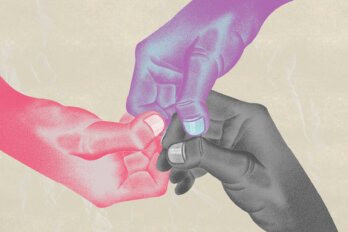Books Discussed In The Essay:
The End of Poverty:
Economic Possibilities for Our Time
by Jeffrey D. Sachs
Penguin Press (2005)
396 pp., $40
The Collapse of Globalism:
And the Reinvention of the World
by John Ralston Saul
Viking Canada (2005)
224 pp., $36
The Battle for the Soul of Capitalism
by John C. Bogle
Yale University Press (2005)
224 pp., $30
In his book The End of Poverty, Jeffrey Sachs cites a 2004 World Bank estimate that there are 1.1 billion extreme poor in the world, people who make an average of 77 cents (US) a day. One of the testimonials on the back of the book is from George Soros, who is identified as “financier and philantropist.” Unmentioned in the book is perhaps Soro’s best-known moment in his past role of currency speculator, when he made $1 billion in a single day in 1992 betting against the British pound. On that day, he made considerably more than the world’s 1.1 billion poorest combined. As a snapshot of globalization, this is skewed but instructive. Soros, who has since renounced globalization, also appears in John Ralston Saul’s book The Collapse of Globalism, and is quoted as saying: “It is a sort of disease when you consider yourself some kind of god, the creator of everything.” One of the failures of globalization is that it hasn’t, in fact, created much. The vast majority of trade between countries has been in the form of currency, stock, and bond speculation, rather than new investment in concrete projects.
And now globalization is dead, according to Ralston Saul. As the eulogies mount, we see a contrary portrait: saint, blackguard, Machiavellian creep, dimwitted pawn, oppressor, benefactor. In the end, flawed but human, that polite funeral catch-all.
Globalization arose, amorphously, in the early 1970s. Because it lacked a coherent, universally accepted definition, it has lent itself to simplifications, to slogans. Ralston Saul defines globalization as looking at civilization through a purely economic prism. The most familiar argument in its favour is that a world united by multinational corporations, rather than divided by nation states, would offer more opportunity for economic growth and less chance of war. It was the same argument made by free traders in the early twentieth century before they ran into the bloody response of World War I. Economics, like fashion, has a limited range, and the ideas keep returning, sometimes as a stock two-button suit (Keynesian theory) and sometimes as a pair of lime-green velvet bell bottoms (Reaganomics).
Trade is said to be the engine of civilization, its benefits obvious. There are recent examples of economies that flowered when borders were opened—Spain, Poland, and China among them. But as an ideology, it has the empty commercial zeal that Sinclair Lewis lampooned in his 1922 novel, Babbitt. For centuries, trade has been a driving force for national economies, but not for civilizations. In Athens, businessmen couldn’t claim citizenship. Rome saw mercantilism as utilitarian. The current economic prism produces a distorted picture of the world that relegates realities such as disease, history, and culture to nuance.
Since globalization’s debut, the gap between the richest and poorest countries has grown. The gap between the rich and poor within developed countries has grown as well. In Britain, it is the widest it has been since the 1880s. The United States has a similar imbalance. Warren Buffet, the sage of the American plains, noted that there has been “more misdirected compensation in corporate America in the last five years than in the previous century.” Unemployment has risen, the debt ratio of developing countries has multiplied, and sub-Saharan Africa has become increasingly impoverished.
Ralston Saul sees postwar prosperity in the West as a golden age (one we can’t match now, despite the increase in wealth, because so much of our current wealth is artificial). With that prosperity came a demographic shift. After World War II, the traditional working class in North America began to disappear, replaced by migrant workers. There are now 120 million such transients in the world. In Europe, the poor from Islamic countries were brought in as menial labourers, the so-called guest workers, of whom there are now 17 million. Initially, they weren’t allowed citizenship and they were culturally alienated, impoverished, and sometimes victims of religious persecution. This may have seemed a logical economic policy, but it was a social calamity, one that is tragically manifesting itself now.
One of the allures of economics as an ideology is that it is measurable. You see progress or failure in mathematical, if not always reliable, terms. In a study produced by the American National Bureau of Economic Research in 2000, the figure for the world’s extreme poor was given as 350 million, a vast improvement over the World Bank estimate of 1.1 billion. The accompanying press release said that the bureau’s research ended the antiglobalization arguments being put forth by academics. Among the countries that showed improvement were Rwanda, where 800,000 people had been victims of genocide, and Botswana, which has the highest aids rate in Africa. What wealth there was was being shared by fewer people so their per-capita worth rose, but it is hard to argue that those countries are better off. As economist Paul Krugman has noted, “Anyone who has seen how economic statistics are constructed knows they are really a sub-genre of science fiction.”
John Ralston Saul warns against defining poverty in purely economic terms: If an African is subsisting in a rural environment, he has zero income. If he moves to a city and lives in squalor, with unsafe water and inadequate food, but earns 70 cents a day, he has moved forward. His progress is measurable and therefore real. So goes the globalization argument.
In The End of Poverty, Jeffrey Sachs writes that this is, in fact, a sign of progress. He argues, in a carefully politic way, for the existence of the garment trade in developing countries, one of the chief targets of the antiglobalization movement. In Bangladesh, women working in the industry spoke of arduous labour, an absence of rights, and harassment in the workplace. But they also said it was the best opportunity they had. They were rural, illiterate, extremely poor, and living in a patriarchal society that allowed them almost no choices. The sweatshops were a step up. Sachs argues that these jobs put them on the bottom rung of the ladder, and from there it is possible to climb. This is a valid, though Dickensian, argument.
Between 1981 and 2001, the number of moderate poor (those earning $1 to $2 per day) has increased from 1 billion to 1.6 billion, while the number of extreme poor has fallen from 1.5 billion to 1.1 billion. It means people are leaving the ranks of the most desperate, that they now have some chance for advancement. But the numbers also indicate that those on the bottom rung haven’t moved up. And the number of basic poor (those in both categories) has grown slightly.
Both Sachs and Ralston Saul argue for retaining some of the principles of globalization, but expanding its narrow economic focus to create an enlightened globalization. Debt relief is a necessity, though in the case of the poorest countries it is more of a noble gesture than a pragmatic measure. For those who aren’t paying anyway, debt relief doesn’t free up any new capital. But it does mean that foreign aid earmarked for debt relief—currency movement that ultimately returns money to the donor—could be used for more pressing needs.
Sachs makes the case that if the G8 countries honour their pledge to give 0.7 percent of their gnps to battle extreme poverty, it will do the job by 2025—a massive challenge but possible if carefully managed. But pledges have a way of dissolving as jet-lagged leaders return to face their own troubled lands. The United States is one of the laggards here, giving only 0.15 percent of its gnp. Part of its reluctance can be attributed to increasing unilateralism, part to its own frightening debt, and the remainder to the growing sentiment that money sent to sub-Saharan Africa is wasted.
George W. Bush’s former secretary of the Treasury Paul O’Neill once said of African aid, “We’ve spent trillions of dollars on these problems and we have damn near nothing to show for it.” In 2002, the US gave $3 toward each sub-Saharan African. After taking out the administrative costs, consultant fees, emergency aid, and money used to service debt, the donation amounted to 6 cents per person.
The other argument commonly made against aid for Africa is: look at Malaysia, Indonesia, Bangladesh, and the two poster children for globalization, China and India. They have all managed to climb up the ladder, yet sub-Saharan Africa remains mired. But China and India aren’t pulling themselves up by their bootstraps so much as reclaiming the position they held less than 200 years ago. In 1820, Japan, Western Europe, China, and India all had roughly the same per-capita gdp. China had been the world’s technological leader for a thousand years (ad 500 to 1500). It’s true that Africa has no shortage of corrupt leaders, and it remains plagued by internecine warfare, but it also has the unhealthy residue of colonial policy, environmental degradation, and pandemic diseases.
The sense that money is being thrown at the problem and having little effect is a fair one. It also represents a failure of globalization itself: the indiscriminate throwing of money.
Another failure is the dismal state of its chief product: capitalism. At a point in history when it is as bloated and morally distorted as Caligulan Rome, it is being exported. In his book The Battle for the Soul of Capitalism, John C. Bogle, a former fund manager and ceo and a lifelong Republican, decries “the remarkable erosion in the conduct and values [of] our business leaders, our investment bankers, and our money managers.”
Capitalism has undergone a fundamental shift from a system based on owners to one based on managers: entrepreneurship and risk have been replaced by a lucrative bureaucracy. In 1980, total pay for ceos in the US was forty-two times the average American worker’s salary. In 2000, the multiple was 531. (It has since gone down to 280.) During his tenure as ceo of General Electric, Jack Welch made almost a billion dollars in salary; in retirement he is receiving $734,000 per month (a mere $614 of which is lost to charity). In 2000, the market capitalization of GE was $600 billion; in early 2005 it was $379 billion. The scale of executive compensation, in salary, bonuses, perks, and stock options, is often ludicrous and not always tied to performance. Performance itself is a moving target. What is it measured against? Stock price? Actual value? The performance of a rival kleptocracy? Punishment for wretched performance is a seven-figure severance.
The reasons for these abuses are manifold. In the last two decades, long-term investing has been displaced by speculation. Individual investors, once the majority, are now dwarfed by institutional investors, who, Bogle says, “must bear a heavy share of responsibility for what went wrong in corporate America.” Mutual funds evolved from an organ of stewardship to one of salesmanship. There is a growing gap between stock price and actual value, and a perilous hunger for instant gratification. Quarterly results are critical; missing your stated earnings estimate often means an immediate, barbarous response from institutional investors and a subsequent drop in share price. There is tremendous pressure to massage numbers to get them in line with earnings forecasts. In a Businessweek poll, two-thirds of chief financial officers said they had been asked to lie about the numbers.
The checks and balances are few and imperfect. Analysts who are employed by investment banks can be compromised by the need to bring in valuable underwriting business. They manufacture favourable reviews to appease new clients. Henry Blodget, a former analyst with Merrill Lynch, loudly touted new Internet stocks (some of them underwritten by Merrill Lynch) that he dismissed in private emails as “crap.” Boards of directors have forsaken their role as shareholder advocates, though, to be fair, shareholders have abandoned the idea to some extent. “When we have strong managers, weak directors, and passive owners, don’t be surprised when the looting begins,” Bogle writes. The last few years have seen the corporate equivalent of the sack of Carthage.
The last line of defence is the accountants who conduct the audits. But some accounting firms have had a conflict of interest in the form of lucrative consulting contracts with the firms they are auditing. In 2000, Sprint paid Ernst & Young $2.5 million for audit services and $63.8 million for other services, a typical ratio, though this conflict of interest is now prohibited under the Sarbanes-Oxley Act, passed in 2002. Investing has always had an element of the sideshow—an opaque, predatory world that usually disappoints once you get inside the tent. But now it is bolder, bigger, and never rests. Bogle argues that shareholders have been robbed of trillions of dollars.
As globalization wanes (and the evidence that it is waning is mostly anecdotal at this point) an older ideology is making a strong comeback. There were twenty-two religious references in the 2002 State of the Union speech. God is riding shotgun in Iraq and occasionally helping out with policy back home in Washington. Leadership tainted by Armageddon theology isn’t a good fit, as the business people say, for the current crisis. Poverty affects almost half the world’s population and is directly linked to social upheaval, military tension, and political instability.
A political leadership is needed that isn’t derived entirely from poll results, or distracted by tax issues, or affiliated with any of the major gods. It is a scarce commodity. Politicians didn’t create globalization but they have done little to realize its potential or limit its abuses. With the absence of political will, we get the rock star we deserve.




